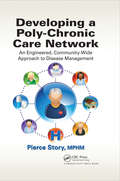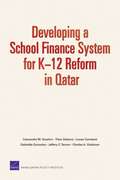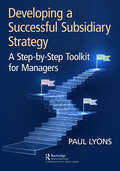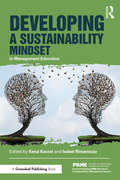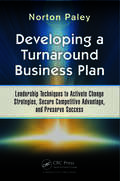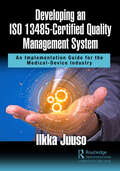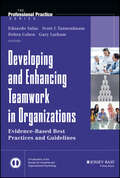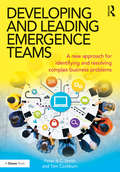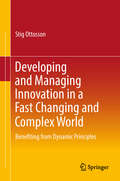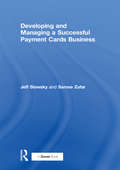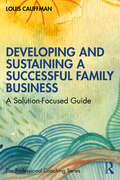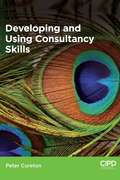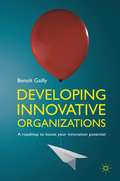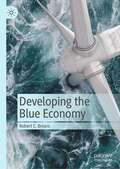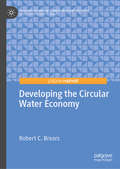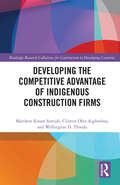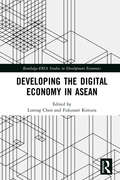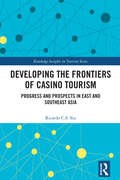- Table View
- List View
Developing a Poly-Chronic Care Network: An Engineered, Community-Wide Approach to Disease Management
by MPHM, Pierce StoryAlthough much has been achieved in care coordination and accountable care, healthcare leaders need additional, game-changing innovations to deal with constraints in clinical resources, care capacity, and cost that have not yet been fully addressed. This need for innovation is especially great in the care of the chronically ill: the most costly, hig
Developing a School Finance System for Ka-12 Reform in Qatar
by Louay Constant Jeffery C. Tanner Titus Galama Gabriella C. Gonzalez Cassandra M. GuarinoReform-minded leaders of Qatar, who have embarked on a sweeping reform of their nation's education system, asked RAND to evaluate their education finance system and offer suggestions for improvements. The authors analyze the system's evolution and resource allocation patterns between 2004 and 2006 and develop analytic tools for performing the evaluation, including a framework that allows assessment of the system in light of six main objectives.
Developing a Successful Subsidiary Strategy: A Step-by-Step Toolkit for Managers
by Paul LyonsMost books on business strategy approach the subject from a corporate perspective – covering topics such as the vision for the business, the marketplace, competition, differentiation etc. However, the reality is that most managers work in sub-units or subsidiaries of the business and they are not involved in corporate strategy formulation. Their strategic concerns are with the positioning and future trajectory of their own units within the complex internal ecosystem in which they exist. If these units are to survive and grow, the middle managers responsible for them must plan their future, maximize their value-add, and compete for resources within the internal market of their corporations. Such internal markets are becoming increasingly volatile due to general economic conditions, but also given the questioning of globalization and increasing corporate concerns about the frailties of international supply chains as brought into sharp focus by the Covid-19 crisis and the war in Ukraine. This book provides practical perspectives for these business unit managers, and a step-by-step toolkit that can be used by management teams to develop a successful subsidiary strategy that acknowledges these challenges while maximizing their contribution to corporate objectives. It is based on the authors 30 years of experience as an executive in a complex multinational (IBM) organization, supplemented by academic study at Masters and PhD level. The material covered has been verified through workshops over a 3-year period with the senior leadership teams of 25 multinational subsidiaries operating from Ireland.
Developing a Sustainability Mindset in Management Education (The Principles for Responsible Management Education Series)
by Isabel Rimanoczy Kerul KasselWith an expanding awareness of the challenges of sustainability, featured more in the daily news than in higher education textbooks, scholars and faculty have been called to connect their syllabi to the ‘real world’. This book doesn’t just offer the ‘why’; it offers the ‘how’ through presenting the definition and model of the ‘sustainability mindset’ to help educators frame curricula to facilitate broad and deep systemic learning among current and future leaders. A sustainability mindset is intended to help individuals analyze complex management challenges and generate truly innovative solutions. The sustainability mindset breaks away from traditional management disciplinary silos by integrating management ethics, entrepreneurship, environmental studies, systems thinking, self-awareness and spirituality within the dimensional contexts of thinking (knowledge), being (values) and doing (competency). This book is aimed at professors, faculty members, instructors, teaching assistants, researchers and doctoral students in higher learning management education programs. Chapter contributors are all teaching professionals from programs around the world, who have been doing research and creating curricula, assessments, tools, and more for the students in their classes, and the book will be globally applicable.
Developing a Talent for Science
by Ritsert C. JansenWant to make the most of your talent for science? This practical guide for students, postdoctorates and professors offers a unique stepwise approach to help you develop your expertise and become a more productive scientist. Covering topics from giving presentations and writing effectively to prioritising your workload, it provides guidance to enhance your skills and combine them with those of others to your mutual benefit. Learn how to maintain your passion for science, inspire others to develop their abilities and motivate yourself to plan effectively, focus on your goals and even optimise funding opportunities. With numerous valuable tips, real-life stories, novel questionnaires and exercises for self-reflection, this must-read guide provides everything you need to take responsibility for your own personal and professional development.
Developing a Teaching Case (Abridged)
by Michael J. RobertsProvides an overview of the case development, interviewing, and case writing process.
Developing a Turnaround Business Plan: Leadership Techniques to Activate Change Strategies, Secure Competitive Advantage, and Preserve Success
by Norton PaleyDeveloping a Turnaround Business Plan is an ideal resource for managers currently facing a competitive crisis as well as those who wish to avert one and must set a turnaround plan in motion before the situation results in irreversible losses.Whereas the book helps readers develop a sound turnaround plan, the focus of the book is on the actual proce
Developing a Virtue-Imbued Casuistry for Business Ethics
by Martin CalkinsCasuistry, Virtue and Business Ethics brings together three important processes for business ethics: casuistry, virtue ethics and the business case method. In doing so, it considers the overlap and synergy of casuistry and virtue ethics, the similarities and differences of casuistry and the business case method and the relationships between emerging and well-established cases. The goal of the book is twofold: to provide a distinctly practical method for moral decision-making within the context of business and to illustrate how contemporary vexing issues are similar to those of the past and how they might be resolved satisfactorily.
Developing a Vision and Strategy: Overcoming Barriers to Organizational Change
by John P. KotterLeading change successfully requires a basic vision, or a picture of the future with some implicit or explicit commentary on why people should strive to create that future. A strong vision clarifies the general direction of change, motivates people to take action in the right direction, and helps coordinate the actions of different people in a fast and efficient way. This chapter was originally published as Chapter 5 of "Leading Change."
Developing a Yoga Home Practice: An Exploration for Yoga Teachers and Trainees (Yoga Teaching Guides)
by Joe Taft Alison LeightonThis book is ideal for all yoga teachers and trainees looking to create a consistent and personal home yoga practice. Whether you're newly qualified and looking for ways to establish a home practice routine, or have been teaching for a long time and are in need of fresh inspiration, this book is packed with tried-and-tested advice.Alison Leighton and Joe Taft provide logical and practical guidance in how to successfully use a home environment as an effective platform for teaching. They also show how a deep engagement with your own practice can nurture understanding, creativity and intelligence to the benefit of your students. This book also coaches teachers and trainees to engage in rejuvenating exercises in order to avoid the burnout well-known to many yoga teachers.
Developing an App for That
by Joshua Gans Nathaniel Burbank Hanna HalaburdaAt a time when ever-rising smartphone sales are driven as much by demand for devices that run must-have third-party apps as by the quality of traditional voice and data services, there is a myriad of challenges facing the software developer who is looking to choose which mobile development software platform to invest in. Written from the perspective of an established consumer bank that is about to commence development on its first downloadable application for mobile devices, the case surveys the state of the smartphone market in 2010 and considers the challenges of a platform landscape that includes significantly varying installed device base sizes, growth rates, application distribution models, and hardware device profiles. Focusing on Apple's market-leading iOS platform and App Store, for iPhones and other devices and on Google's developing Android OS and associated Android Market, the case considers potential benefits and pitfalls of each and touches on the reasons that other longer-standing platforms, such as RIM's BlackBerry platform, are less appealing to modern-day application developers.
Developing an ISO 13485-Certified Quality Management System: An Implementation Guide for the Medical-Device Industry
by Ilkka JuusoDeveloping an ISO 13485-Certified Quality Management System: An Implementation Guide for the Medical-Device Industry details the lessons learned from a real-world project focusing on building an ISO 13485:2016 Quality Management System (QMS) from scratch and then having it officially certified. It is a practical guide to building or improving your existing QMS with tried and tested solutions. The book takes a hands-on approach–first teaching the top 25 lessons to know before starting to develop a QMS and then walking you through the process of writing the quality manual and the standard operating procedures, training the staff on the QMS, organizing an internal audit, executing a management review, and finally passing the necessary external audits and obtaining certification. It helps you to progress from one task to the next and provides all the essential information to accomplish each task as quickly and efficiently as possible. It does not attempt to replicate the standard but instead drills into the standard to expose the core of each section of the standard and reorganize its contents into a practical workflow for developing, maintaining, and improving a Lean QMS. The book includes a wealth of real-world experience both from the author's personal dive into quality management, and from the experiences of other companies in the field and provides handy checklists for ensuring key documents and processes are fit for use–the emphasis here is to help ensure you have considered all relevant aspects. In addition, the book is not intended as a “cheat sheet” for the standard or as a review of the standard that only adds lengthy commentary on each of the clauses. Instead, the book fixes easy misunderstandings regarding QMS, provides insight into why the various clauses are written the way they are, and provides a great base to both understanding ISO 13485 QMS and developing your own QMS. The book is intended to serve both experts and novices audiences–it provides special insight on the most crucial and effective aspects of QMS.
Developing and Branding the Fashion Merchandising Portfolio
by Phyllis Borcherding Janace E. BuboniaA career in fashion merchandising means working in a fast-paced, creative industry-and a highly competitive one. Developing and Branding the Fashion Merchandising Portfolio is a guide to creating a portfolio and brand for yourself that will stand out. <p><p>Portfolios provide immediate visual evidence of what you can do, and they communicate hands-on experience more explicitly than a résumé can on its own. Whether you're interested in design, product development, buying, textile design, or trend forecasting, this book provides activities to help you identify and focus your skills. <p><p>Step-by-step instructions demonstrate how to gather examples of your work, how to choose a design and layout, and ways to incorporate drawings, sketches, and CAD-generated material into a consistent, streamlined portfolio that reflects your personality. User friendly and above all visual, this is the guide for creating a portfolio that will get you hired-and keep your career on track.
Developing and Enhancing Teamwork in Organizations
by Deborah Cohen Eduardo Salas Scott Tannenbaum Gary LathamThis new volume in the SIOP Professional Practice Series provides evidence-based guidelines to help practitioners seeking advice, recommendations, and guidance for developing and enhancing high-performance teams. Co-Published by the Society of Industrial and Organizational Psychology, this volume features all-star editors and contributors highlighting the evidence, the lessons learned, the principles and the findings that matter when composing and managing work teams. Global I/O faculty and practitioners, students, and HR professionals will benefit from discussion on the organizational influence on teams; the leader's contribution to the teams; and how context matters in teams.
Developing and Leading Emergence Teams: A new approach for identifying and resolving complex business problems
by Tom Cockburn Peter A.C. SmithDeveloping and Leading Emergence Teams describes a future business landscape that seems to be complicated, complex and chaotic, in almost equal measures. The variety and diversity of the environments within which large organizations will be seeking to operate, require a similar variety of systems, process and structures if they are to respond successfully to emerging opportunities. The established models of teamworking (matrix, cross-functional or transdisciplinary) can all adapt to this new environment but will only do so if the culture, leadership and management style of the business enables this. The authors describe a model of emergence teams; high-trust teams that exhibit exceptional affinity for knowledge sharing, sense making, and consensus building. They then explore the specifics of leading such a team, how the team leader should: design the team; interact and facilitate the team’s development; understand the personal nature of each of the team members and the overall emotional regime that will affect trust, commitment and motivation. Peter Smith and Tom Cockburn draw on research and detailed case examples to provide techniques your organization can adopt in order to build and support the various teams capable of addressing complexity.
Developing and Managing Innovation in a Fast Changing and Complex World: Benefiting from Dynamic Principles
by Stig OttossonThis book provides essential insights into how to rapidly and safely develop new sustainable products, no matter whether it is in the private sector, the public sector or the non-profit sector, and regardless of the specific national or business culture.The principles discussed were distilled from experiences and insights gained in numerous practical innovation endeavors, and from insider action research in connection with ongoing development, change management, and innovation projects in various areas and branches of the business world and non-commercial sector.In short, the practical work and research has revealed that, regardless of the specific product and/or business to be developed, clear advantages can be gained by using dynamic or agile methods based on modern theories. These advantages include: reduced risk of failure, shorter time to market, less money and effort spent, better outcome solutions, etc. than when classical methods are used. Accordingly, the book also highlights the differences between the classical/traditional and dynamic mindset and approaches. It offers suggestions on how to think, organize, lead, and act in order to excel in an increasingly complex and non-linear world. The more you can assimilate the theories, principles and methods – and integrate them in the culture you operate in – the greater the benefits will be for you and your organization.
Developing and Managing a Successful Payment Cards Business
by Jeff Slawsky Samee ZafarThe credit card industry today is a multi-trillion dollar business that employs hundreds of thousands of people across the globe and impacts literally billions of people every day. Yet there is no comprehensive book or reference material available in the marketplace that provides fact-based perspectives on how to develop and manage a successful card business - despite the significant demand from all those involved in the industry. Developing and Managing a Successful Payment Cards Business offers information, analysis, observations, perspectives and advice on developing and managing a card business. There is comprehensive coverage of all areas including card business strategy, product development, customer acquisition and retention strategies, and product marketing techniques. The book also reviews underlying infrastructure components relating to operations and systems including risk management and transaction processing and suggests improvement techniques. There is detailed discussion on portfolio performance and profitability evaluation, as well as new technology developments and emerging payment systems such as chip cards and mobile payments.
Developing and Sustaining a Successful Family Business: A Solution-Focused Guide
by Louis CauffmanThis practical and important book offers ideas, examples, and suggestions that address the challenges inherent to developing and sustaining a successful family business. It explores the complex dynamics involved in working with loved ones and how to pass a business on to a new generation. Structured around the story of a family that has built a successful enterprise, now facing the issues of succession, the book utilizes the solution-focused model to provide step-by-step instructions to creating good working relationships and orienting toward common goals while building trust, respect, and love. Complete with summaries, toolkits, and case studies, this book is an essential read for any member of a family business, as well as those who provide services to family businesses, including coaches, consultants, and non-family employees.
Developing and Using Consultancy Skills
by Peter John CuretonDeveloping and Using Consultancy Skills supports students and practitioners in their understanding of the meaning of consultancy and the skills required in consulting in a learning and development context. It covers all the stages in the consulting process and provides guidance on engaging with the client, clarifying the nature of the issues, agreeing the research areas and analysing feedback. Developing and Using Consultancy Skills also includes essential coverage of common problems with client-consultation relationships and how to overcome these as well as discussion of ethics and consultant behaviour. Essential reading for anyone studying the intermediate CIPD L&D qualification, this guide will not only equip students for their studies, but also for their role as L&D professionals in the workplace.
Developing innovative organizations
by Benoît GaillyCombining insights from leading academic research and experienced managers, this book provides a systematic framework to understand what innovation is, why it matters, how it can be managed and how it can help your organization to reach its objectives.
Developing the Blue Economy
by Robert C. BrearsTraditionally, the ocean economy is viewed solely as a mechanism for economic growth. In this business-as-usual approach, large-scale industrial economies have developed the ocean economy through the exploitation of maritime and marine resources, often without consideration of how those activities impact the future health or productivity of those same resources. This has led to aquatic ecosystems being viewed and treated as limitless resources; the marine environment becoming a dumping ground for waste; overfishing diminishing fishing stocks; ocean habitats being degraded from coastal developments; sea-level rise impacting coastal communities and infrastructure; increasing ocean acidification; and the marginalisation of poor coastal communities.Recognising the failings of the traditional ocean economy, there is a transition underway around the world towards the Blue Economy. This concept moves beyond the business-as-usual approach with economic development and ocean health complementary to one another. In the Blue Economy, the environmental risks of and ecological degradation from economic activity are mitigated or significantly reduced. Therefore, economic activity is in balance with the long-term capacity of the ocean ecosystems to support this activity and remain healthy and resilient. This book will provide an overview of the various technologies used to promote cross-sectoral and multi-scalar collaboration, facilitate the integrated management of sectors and resources, foster partnerships between governments and industry, encourage R&D in new technologies in resource use and management, and scale-up innovative financing mechanisms in the development of a Blue Economy. Also, the book will contain in-depth case studies that illustrate how locations, of differing climates, lifestyles and income levels, have implemented technologies to facilitate the development of the Blue Economy.Developing the Blue Economy will provide an accessible resource for practitioners and researchers working in the field on the various innovative technologies being implemented around the world to create a Blue Economy.
Developing the Circular Water Economy (Palgrave Studies in Climate Resilient Societies)
by Robert C. BrearsThis book presents new research on policy innovations that promote the development of the circular water economy. In contrast to the linear economy, the circular water economy promotes the reduction of water consumption, reuse of water, and recovery of resources from wastewater to not only increase resilience to climate change but also to reduce greenhouse gas emissions resulting from the provision of water and wastewater-related services. Providing a series of in-depth case studies of important locations in differing climates around the globe that have implemented a variety of policy innovations to develop the circular water economy, this book is a valuable resource for water and resource conservation managers, policymakers, international companies and organisations interested in the circular economy, environmental NGOs, researchers, as well as graduate and undergraduate students. · Systematically reviews policy innovations to develop the circular water economy· Illustrates how leading locations from around the world have developed the circular water economy to increase resilience to climate change while reducing emissions · Provides ‘best practices’ for other locations around the world aiming to implement the circular water economy
Developing the Competitive Advantage of Indigenous Construction Firms (Routledge Research Collections for Construction in Developing Countries)
by Matthew Kwaw Somiah Clinton Ohis Aigbavboa Wellington D. ThwalaThis book takes a pragmatic approach to develop the competitive advantage of indigenous construction firms in the Global South, using Ghana as a case study. It provides readers with two major practical insights. The first focuses on the theoretical underpinning of firms’ competitive advantage and develops a competitive advantage model for indigenous construction firms. This competitive advantage conceptual framework aids in explaining the main and sub-attributes underpinning the competitive advantage of indigenous construction firms as well as providing the basis for assessing a firm’s competitiveness. Secondly, it highlights and addresses theoretical gaps in existing competitive advantage studies deemed essential for indigenous construction firms. Finally, a detailed two-stage Delphi study in the Ghanaian construction industry is presented as a case study. The book is therefore of interest to researchers in construction management, strategic management, civil engineering, business administration, marketing, entrepreneurial and economic studies. It is an essential manual for owners and managers of construction businesses. It is also useful for government departments and non-governmental agencies seeking innovative ways to develop the capacity of indigenous firms and/or contractors to make them more responsive to competitive bidding scenarios, delivery of projects, and satisfying the needs of the industry’s stakeholders.
Developing the Digital Economy in ASEAN (Routledge-ERIA Studies in Development Economics)
by Fukunari Kimura Lurong ChenThis book advances the international debate on the development of e-commerce with focus on emerging ASEAN economies. It provides readers insights on Asia’s needs and efforts to improve the regional legal and economic conditions to support e-commerce. This book looks at the rules and regulations on e-commerce, and e-commerce for inclusiveness growth. It provides insights from several ASEAN member states and discovers the requirements for Asian countries to better grasp the new juncture of growth associated with economic digitalization, which also have deep implications on continuous regional integration and community-building.
Developing the Frontiers of Casino Tourism: Progress and Prospects in East and Southeast Asia (Routledge Insights in Tourism Series)
by Ricardo C.S. SiuThis book explicates how the frontiers and path of development of casino tourism in various destinations in East and Southeast Asia are shaped by a set of social, cultural, political and economic forces and their interplays in a dynamic environment, and the prospects of this industry in different destinations in the 2020s and onward.Casino tourism has been a rapidly growing industry in East and Southeast Asia in the 2000s and 2010s. By scrutinizing the respective evidence from the better-developed, emerging and potential casino tourism destinations in East and Southeast Asia (which include Macao, Singapore, Malaysia, South Korea, the Philippines, Vietnam, Cambodia, Myanmar, Japan, Thailand and Taiwan), the book analyses specific contextual dimensions, including social, cultural, political and economic standpoints; the pragmatic features associated with the progress of this industry; and performances of casino tourism at the various East-Southeast Asian casino tourism destinations. Additionally, it also explores the impacts of the “China factor” and the resultant changes to the development frontiers of casino tourism. Thus, readers who would like to gain realistic insights into the underlying forces and dynamics of the practices and prospects of this industry will find this book informative and compelling.This book provides a comprehensive and succinct reference to students and industry practitioners in the areas of tourism, casino gaming and integrated resorts who wish to gain further insights into the general and essences, business routines and prospects of casino tourism development in East-Southeast Asia. Academics may also find this book a useful source for further exploration.
